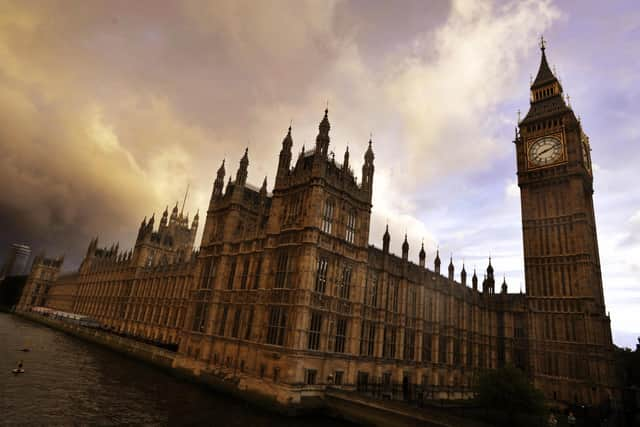Windsor Framework will make the Irish Sea border worse than it has been under the Northern Ireland Protocol with grace periods, says House of Lords
and live on Freeview channel 276
(Scroll down for more: Report repeatedly calls for clarity on how barrier will work; link to editorial)
In a 133-page report on Rishi Sunak’s Brexit deal, published today, peers urged the government to “answer outstanding concerns highlighted by businesses and retailers”. The issues it raised include worries about labelling, veterinary medicines, the effects of regulatory divergence, the movement of livestock and an apparent lack of clarity on how trade arrangements will operate in practice.
Advertisement
Hide AdAdvertisement
Hide AdThe Lords’ Sub-Committee on the Protocol on Ireland/Northern Ireland, which includes peers from Northern Ireland and elsewhere, consulted “business representatives, trade bodies, academic, legal and trade experts,” as well as community organisations, the government and the EU commission, as it compiled its findings on the framework. It said the new arrangement was an improvement on the protocol as originally agreed but it asked for repeated clarification in areas where there are trading or political concerns about the barrier.


The government’s deal, which ministers claim will remove “any sense” of a border in the Irish Sea, will start to be implemented in the autumn and the new trading set-up is due to be in place fully by 2025. It will feature a ‘green lane’, with the prospect of fewer customs formalities and checks for some goods for sale in Northern Ireland, but many products, including most materials for manufacturing, must travel through a ‘red lane’ that involves tougher requirements.
The committee’s report said that “business representatives and other stakeholders have welcomed the agreement of the UK and the EU of a mutually agreed solution, and the potential this provides for problems that arise in the future to be resolved in a collaborative manner”. But it challenged the idea that the deal removes ‘any sense’ of an Irish Sea border, noting that, “for some businesses, the processes under the Windsor Framework will be more burdensome than under the protocol as it has operated with grace periods and easements. While the green lane will benefit large retailers in particular, some retailers, and some other sectors, may have to use the red lane”.
According to the committee, there has been “no substantive change” to the role of the EU’s European Court of Justice (ECJ) in Northern Ireland. In its framework document, the government claimed that it had ‘disapplied’ over 1,700 pages of European law, and removed the “ECJ oversight that comes with it”.
Advertisement
Hide AdAdvertisement
Hide AdHowever, the report said: “While these laws are disapplied for the movement of goods from Great Britain to Northern Ireland via the green lane, they will apply for movement of goods via the red lane, and for all goods produced in Northern Ireland itself.”


It urged the government, to set out clearly the basis for its reference to the “disapplication of 1,700 pages of EU law from Northern Ireland”. According to the committee, the deal’s ‘compromise’ on state aid also “gives rise to some uncertainty”. The original protocol caused anxiety by seeming to grant the EU powers to block government support to businesses, but the UK had claimed the framework was, “providing more certainty for both aid providers and aid granters in Great Britain, and supporting trade within the UK internal market with Northern Ireland”.
The report highlights numerous apparent discrepancies between the government’s claims about the Windsor Framework, the EU’s interpretation, and its implementation by parliament. “Our witnesses described the technical and legal complexity of the Windsor Framework, and the multiple documents and legal texts that form part of it,” it said. “They also noted the difference in emphasis between the UK and the EU in their descriptions of some of the Windsor Framework’s provisions. The government and the EU have an obligation to explain to stakeholders clearly what the provisions of the Windsor Framework mean in practice. It is incumbent on the UK and the EU to publish a comprehensive summary of the Windsor Framework’s provisions, including the consolidated text of the original protocol as amended by the Windsor Framework.”
The committee said it had reflected businesses’ concerns, “about the lack of operational detail over aspects of the Windsor Framework, including the green and red lanes, parcels and labelling,” against the “backdrop of tight deadlines for compliance”. The report noted that, since the evidence-gathering sessions, the government had published ‘guidance documents’ on some aspects of the new arrangements “with more to follow”.
Advertisement
Hide AdAdvertisement
Hide AdThe committee said that it would therefore, “explore with stakeholders in the autumn the extent to which the published guidelines have assuaged (businesses’) concerns”.
• Report repeatedly calls for clarity on how the internal UK trade barrier will work:
The Lords’ framework report was published by its Sub-Committee on the Protocol on Ireland/Northern Ireland, which is part of the upper house’s European Affairs Committee. Its members include the former UUP and SDLP leaders, Lord Empey and Baroness Ritchie, ex-DUP deputy leader, Lord Dodds and ex-police ombudsman, Baroness O’Loan. Chaired by the former foreign office minister, Baron Jay of Ewelme, it contains one-time Northern Ireland secretary, Lord Hain, David Trimble’s biographer Lord Godson, Conservative Brexiteer, Lord Hannan, and the Liberal Democrat, Lord Thomas. The committee started its inquiry in March, holding seven evidence sessions and receiving 43 written submissions.
The report said: “Some of us support the Windsor Framework, others of us either oppose it or retain significant concerns over it … We see our task as not to argue for or against the … Framework itself, but rather to scrutinise its provisions in an objective and evidence-based manner.”
Advertisement
Hide AdAdvertisement
Hide AdIn its conclusions the committee repeatedly invited the government to respond to concerns raised by businesses about the framework. Areas where it sought clarification include:
• The ‘limited scope’ of the green lane, which the report said would exclude many businesses;
• The prospect that abiding by EU regulations would put NI companies at a ‘competitive disadvantage’ to their counterparts in GB;
• The lack of detail on how ‘mixed loads’ of goods and ‘groupage’ would be dealt with under the framework;
Advertisement
Hide AdAdvertisement
Hide Ad• The confusion on labelling requirements for goods moving between GB and NI;
• The continued prohibition on bringing many species of plants and trees into Northern Ireland from the rest of the UK;
• The prospects of a deal on veterinary medicines, which has not yet been forthcoming.
The report also pointed out that, while some protocol provisions on VAT have been eased, “EU VAT rules for goods continue to apply as a default … [we invite] the government to provide an update on its dialogue with the EU on the development of a list of goods not subject to EU law”.
Advertisement
Hide AdAdvertisement
Hide Ad